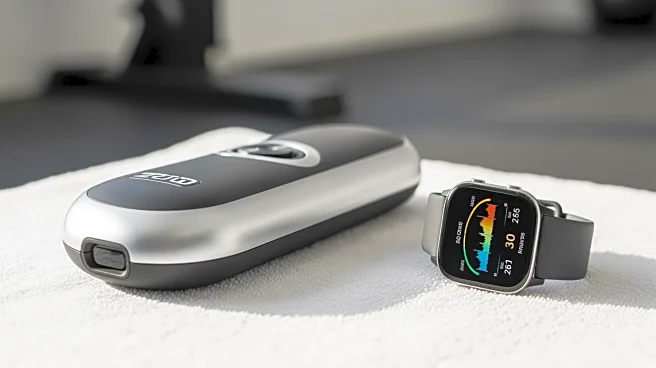What's Happening?
Usman Khawaja, a prominent Australian cricketer, is preparing for the upcoming Ashes Test with a focus on maintaining his physical and mental sharpness. At 38, Khawaja has adapted his training regimen to accommodate the challenges of aging, emphasizing
the importance of understanding his body's needs. He uses a Samsung Galaxy Watch8 to track his exertion, output, and recovery, ensuring a balanced approach to nutrition and physical activity. This data-driven method helps him manage the difficulties of maintaining muscle mass and overall fitness, which were easier in his younger years. Additionally, Khawaja prioritizes sleep as a critical component of his recovery strategy, leveraging technology to optimize his rest and enhance his performance on the field.
Why It's Important?
Khawaja's approach highlights the growing trend of athletes using technology to enhance their training and recovery processes. By integrating data analytics into his routine, Khawaja exemplifies how modern athletes can extend their careers and maintain high performance levels despite the natural decline associated with aging. This method not only benefits individual athletes but also sets a precedent for sports teams and organizations to invest in technology that supports athlete health and longevity. As sports continue to evolve, the use of wearable technology and data-driven strategies could become standard practice, influencing training methodologies and recovery protocols across various disciplines.
What's Next?
As Khawaja prepares for the Ashes Test, his focus on technology and recovery may inspire other athletes to adopt similar practices. The success of his approach could lead to broader acceptance and implementation of data-driven training and recovery techniques in professional sports. Teams and coaches might increasingly rely on technology to monitor and optimize athlete performance, potentially leading to advancements in sports science and athlete management. Additionally, Khawaja's emphasis on sleep and recovery could prompt further research into the impact of rest on athletic performance, encouraging a holistic view of athlete health and well-being.
Beyond the Headlines
Khawaja's reliance on technology for fitness tracking and recovery underscores the ethical considerations surrounding data privacy and athlete monitoring. As wearable devices become more prevalent, sports organizations must navigate the balance between optimizing performance and respecting individual privacy. Furthermore, the cultural shift towards technology-driven training raises questions about accessibility and equity, as not all athletes may have access to such resources. These developments could influence discussions on the role of technology in sports and the responsibilities of organizations to ensure fair and ethical practices.


















